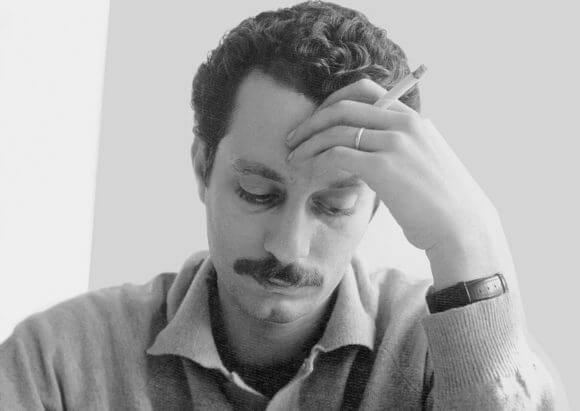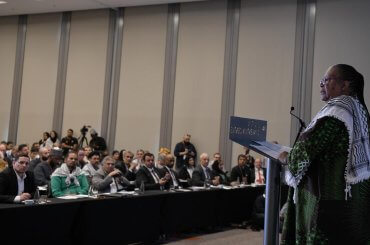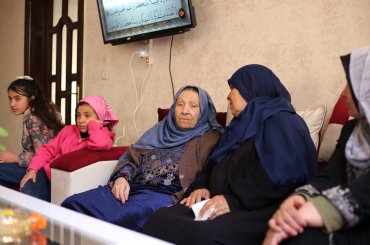I am often asked, in interviews and on university campuses, what role I think literature plays in the Palestinian liberation movement. And though the question itself isn’t subversive, it certainly feels that way: What is the role of literature? Who does it serve, here, in the English-speaking world, in fancy hotel lobbies and Ivy League auditoriums, planets away from the makeshift rifles of the refugee camps? It’s hard to say. It’s hard to imagine what a poem can do in the barrel of a gun.
Usually, I would offer my standard anecdote: Rashid Hussein wrote his sardonic poem, God Is A Refugee, in protest of the 1960 Israeli “Land Law,” which prohibits the selling or transfer of “state-owned” lands (as in 93% of all lands seized in 1948), and the 1950 “Absentee Property Law” which allowed the Israeli government to arrogate the properties of Palestinian refugees dispossessed during the Nakba. His poem not only documented Zionist land theft but it helped catalyze the farmers and landowners toward launching a general strike….” I provide the easy answers: artists raise awareness globally and fuel the masses locally. But sometimes, I’m tempted to say otherwise. I’m tempted to say that it’s all smoke and mirrors, that after all of the poems and essays and speeches, there is not a dent in the status quo.
It’s becoming increasingly difficult to resist that temptation. The more I’m accoladed with adjectives and platitudes for my writing, the more I’m reminded that such accolades are oversized and meaningless, especially as others receive no such recognition having suffered—and continue to suffer—behind bars and in hospital beds, having sacrificed their limbs or their lives even. And especially as the perfunctory “existence is resistance” sentiment remains en vogue (this is not to be confused with Existence is Resistance the organization). Make no mistake, Mahfoutha Shtayyeh’s existence, as she clings onto her olive trees in the face of bulldozers, is resistance. The existence of Palestinians confronting expulsion in Silwan, Sheikh Jarrah, and Masafer Yatta, confronting erasure in Lebanon’s refugee camps, etcetera, is resistance. But what about those of us who have more mobility and access? How can our contributions transcend symbolic identitarian gestures? Again, it’s hard to imagine what a poem can do in the barrel of a gun.
Guilt is the obvious response here, but guilt is dormant; it’s far more productive to talk about obligation. In particular, the obligation attached to being artists and knowledge producers in the public sphere. I am often reminded of the late Basel Al-Araj’s words, “If you want to be an intellectual, you have to be engaged,”—though I am inclined to argue the Arabic word for ‘engaged’, mushtabik, carries much more militant connotations—“If you don’t want to be engaged, if you don’t want to confront oppression, your role as an intellectual is pointless.”
For the past few months, I’ve been dragging my friends into enervating debates about my dilemma. What is the role of cultural production in a liberation struggle, in our liberation struggle to be exact? A friend of mine, a member of the Palestinian Youth Movement, told me that “art cannot exist for art’s sake,” that it must serve a greater purpose in the struggle. Another friend—a singer—argued that artists are more effective when they tackle individualized narratives rather than what he called “the abstracted slogans of the cause.” Others pointed to some of the great poets and writers who crafted the discourse that I regurgitate today, and asked how I can be a cynic and a parrot at the same time.
One of those names is, of course, Ghassan Kanafani, who not only exemplified what it means to be an “engaged intellectual,” but also intimately understood how our enemies have never ceased weaponizing the arts as “a crucial and indivisible part of [their] movement.” In On Zionist Literature, his 1967 book which was recently translated to English, he writes, “Political Zionism employed [literature] extensively not only for its propaganda efforts but for its political and military campaigns as well.”
Though all of my friends seemed to believe that art and culture do play an intrinsic role—all except one friend who believes in the rifle and nothing but the rifle—none agreed on the nature of that role or how it should manifest systemically. Our debates have led to no consensus. And they were enervating, not invigorating, because, beyond the easy answers (awareness, fuel, etcetera), stubborn follow-up questions prevailed: Should artists be beholden to national or cultural institutions (what institutions?) that govern their artistic practice? Who, against the backdrop of a civil society wounded by criminalization, corruption, and scant resources, can provide the tools necessary for a revolutionary renaissance? Am I undermining artistic freedom should I suggest that artists are assets of our struggle? Who, in the absence of political leadership, has the authority to answer these questions?
I’m aware that I don’t have the expertise to solve the questions above—which have been posed by many before me, many times—nor will I attempt to do so in this short essay. I am merely interested in the idea of the artist’s obligation, and how that obligation can be harnessed.
When I met with Jeremy Corbyn last April in London, I wanted him to talk to me about sanctions, sanctions, and more sanctions. Instead, I was surprised to hear him speak about the promises of my generation, the young Palestinians who sing and write poems and make films, who, to him, seemed to be the inevitable future of Palestinian advocacy. He insinuated that there is an inherently messianic quality to cultural production, echoing, perhaps unwittingly, the notion that “the Third Intifada will be a cultural one,” a quote often attributed to Juliano Mer Khamis, who founded the Jenin Freedom Theatre with jailbreaker and former al-Aqsa Martyrs’ Brigades leader Zakaria Zubeidi and other activists. I find this view to be romantic and reductive for reasons I’ve stated earlier. However, if there were indeed an angel in the marble, it would not carve itself out without assistance. A so-called cultural intifada isn’t going to come about haphazardly, not without a mammoth infrastructure and enormous organizational backing.
Obligation, for me, is a placeholder for the institution. As a writer with a public platform, I should at least acquire a political education and preferably seek political counsel if I am going to deal with Palestine in my work. I’m not suggesting that our contributions must necessarily be didactic or militant. Nor am I calling for state-regulated patronage to be instituted in our beloved, dysfunctional State of Palestine (I didn’t realize a Ministry of Media existed in Ramallah until the killing of Shireen Abu Akleh). I’m simply suggesting that our situation—which has been mystified by decades of obfuscation and fabricated nuance—should be handled cautiously. In the absence of political and media resources, public statements about our collective struggle should be informed by the collective. In short, they must be loyal to the Palestinian street.
A friend called this position “unfair.” I had shared it in the form of critiques directed toward Mo upon its release on Netflix (I’ll refrain from expanding for the sake of length). “It’s unfair to expect one TV show to carry Palestine on its back,” she said. And I agree: burdening our artists with responsibilities not carried by other artists is unfair. But it is what it is. It is so rare to encounter the Palestinian People in the mainstream, especially in the English-speaking world, so much so that a show like Mo is possibly an average American viewer’s first interaction with our plight—at least outside of our villainized cameos on CNN or the New York Times. Mo, of course, is only an example and, to my point, there aren’t many.
It’s not lost on me that I’m running the risk of appealing to populism by using language such as “loyal to the Palestinian street,” and even the risk of subscribing to the same identity politics I normally denounce. The very identity politics that allow Zionist publications to enjoy increased credibility having hired Palestinian stenographers to purport their propaganda. Mo Amer’s Palestinian identity isn’t what incentivized me to think critically about his TV show (I’m not lobbying the famously Palestinian DJ Khaled to record an album celebrating the Lions’ Den). Rather, it is because Palestine, by design, is a large part of the television series. The obligation, then, isn’t so much that of an artist or Palestinian artists exclusively, but towards the art itself, if Palestine is its chosen focal point.
The scarcity of representation that makes a show like Mo or a film like Farha notable means Zionist organizations are more likely to pounce any time there’s a new song, film, or college course that merely sheds light on the Palestinian plight, let alone sympathize with it. And nothing escapes the Zionist backlash; not the most docile of children’s books nor painted ceramic plates created by children in Gaza; not even the news stories that are sympathetic to Palestine but still cite Israeli officials’ statements as if they are doctrine to avoid controversy. With that in mind, how can one in good conscience produce a critical review of something that is already under so much attack?
But our rightful protectiveness of Palestinian art—in addition to the fashionable “existence is resistance” sentiment—means that all of our cultural production in the English-speaking world is at risk of being treated the same. The radical is lumped in with the liberal; the unabashed is lumped in with the desperately persuasive. The standard for Palestinian art to be good becomes simply its identity. But without criticism—meaningful criticism, not criticism that looks for landmines in every field—there can’t be growth. Or put another way, without criticism or challenge, the dialectical relationship between the artist and the “street” cannot be maintained or interrogated, and the role of the artist becomes solely ceremonial.
One may argue that I’m splitting hairs by stating that said obligation does not fall on Palestinian artists but rather any artists choosing to represent Palestine in their work. Still, despite those semantics, the fact remains that many Palestinians find themselves having to represent their communities regardless of whether it is their responsibility. Our politicians are incompetent and complacent, even complicit. Decades of destabilization, of colonial violence and erasure, have placed us in this sour predicament. Any given Palestinian, especially an artist, and especially in the mainstream, may be tasked with the job of a community spokesperson and, so often, it happens overnight. In fact, this applies in almost every field, not just the arts.
While all of us are inherently racialized because of location (and dislocation), not all of us engage in activist work—as is the case with every society. Some, if not most of us, are called into the ring at a random point in our life—almost always as a reaction to a profoundly personal emergency. I was 11 years old when I first found myself campaigning with my broken English to save my home in Sheikh Jarrah from violent dispossession, while Ru’a Rimawi had just finished medical school when she was plunged into the world of advocacy, demanding justice for her two martyred brothers, Jawad and Thafer. We were both transformed into one-person media ministries, scrambling to create a crisis around what the media cycle usually treats as a quotidian occurrence. And we are not unique nor rare cases; the examples are countless.
When I speak about ethnic cleansing in my home and the larger Jerusalem on television, I don’t consider myself to be an ambassador of the Palestinian People nor was I elected to be one (in all fairness, neither was the PA). But in that moment, I represent the Palestinian People—against my wishes and possibly even against theirs. Resolving this tension, I’ve often told myself, is possible by transforming oneself into a vessel for the collective. As unfortunate and as unfair as it may be, I must prepare myself for it. That is the obligation, I’ve always thought.
But not everyone makes this decision. In a recent interview, Shabjdeed, a popular rapper from Jerusalem, explained why he released an apolitical record following the massive success of his 2021 song, Inn Ann, which easily fits in the genre of revolutionary music. He said, “I can guarantee you that I will not liberate the homeland by rapping.” He not only refused to oblige, he satirized that obligation. I respect this position, particularly as it acknowledges the limitations of any given art form operating independently, outside of the confines of an organized movement.
One morning in a friend’s living room in Haifa, my friend’s neighbor, who happens to be an artist, tapped me on the shoulder while I was answering emails (“playing on my phone” as he put it). “Do you want to know how we can become more like the Jews?” “No,” I responded. “Every single Israeli,” he continued anyway, “They all serve in the army for three years, then another cohort does the same. We don’t have that.” He was right. In the absence of a military, there is no defined national duty for Palestinians. If, indeed, the revolution was going to be televised, shouldn’t it be a bit more systemic?
The proposition brought forth by my friend’s artist neighbor reminded me of a similar rant: Ruth Wisse, Professor Emeritus of Yiddish Literature at Harvard, spoke to “American Jews” and said, “Every one of us has to serve two years in the army, two years in the army, some of us five years… You have to serve two or three years in the army of words. You’ve got to learn to fight the political battle, which is even more important at this point than the military battle… You’ve got to learn how to fight back on the campuses, how to make the arguments.”
Something about Wisse’s shrieking sentiment, I’m afraid, resonates. An “army of words” is where obligation reimagines our participation in the struggle as calculated, instead of random and reactionary. I’m not saying art and culture will replace the rifle—rather, I’m saying there should be no rock left unturned.
Even though there has been 75 years of Palestinian scholarship and knowledge production, and every journalist, diplomat, and lawmaker has access to visual and material evidence of the atrocities committed against the Palestinian people, I believe, at least for the time being, that we are not past the time for persuasion. Artists can and have influenced international public opinion in many instances across history. This is certainly true for Zionism. Zionist literature’s “disciplined march to the rhythm of the political movement,” as Kanafani put it, “as it crescendo[ed] from novel to novel, and from story to story,” certainly served its colonial project in Palestine.
I recently sat down for an interview with actor and playwright Raeda Taha. When I shared with her my devastated revelation that if I stood and read a poem before the Qalandiya military barrier, it wouldn’t crumble and catch fire, she invoked the same crescendo: “[Liberation] is a matter of accumulation. Anything that has been done and is being done now for the cause will not go in vain. It is an accumulation of so many small victories that will lead us somewhere one day. I don’t agree with you that a poem will not liberate, or a song will not liberate, or a play will not liberate. All of these, plus so many other things, will move something along the years. We are building on what we have done since 1948, and even before that.” In this context the role of the artist in a liberation movement is the same as any member of that movement. Accept the obligation to participate in the climb.



Thank you for your amazing work.The fear factor in the US discourse cannot be ignored. Palestinian artists, intellectuals, public figures etc face that as the net tightens, when freedom of speech and liberty of the individual become less and less of democratic values, and especially when it comes to those American Palestinian voices struggling for justice. Unless you are living and breathing that sentiment and ready to lose everything for it, that fear of facing the music, and it is a very loud and awful music, will have might and might is power (even if not right). Rather than losing everything, some have chosen the easy way, no judgment being made here, by staying away and pretending they are not who they are. And that is a loss.There must be a way to grapple with that and until the balance of power changes, and it will.